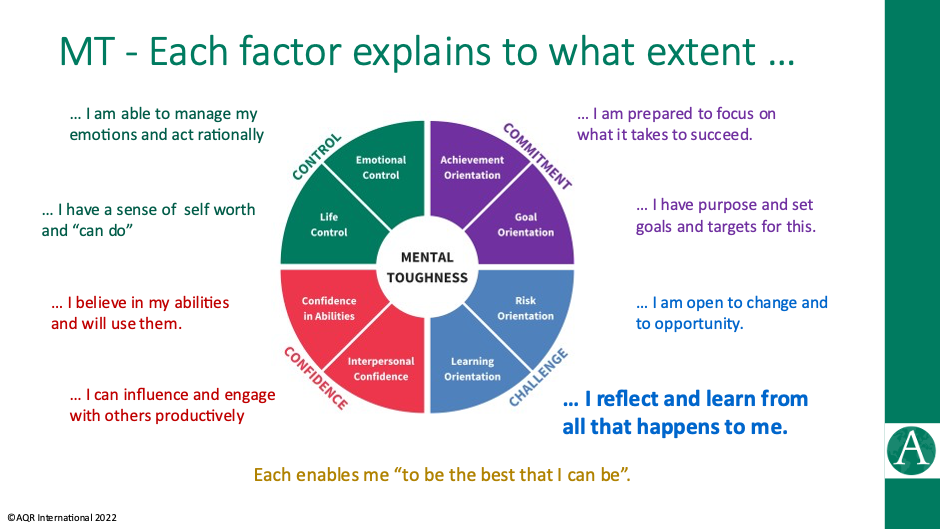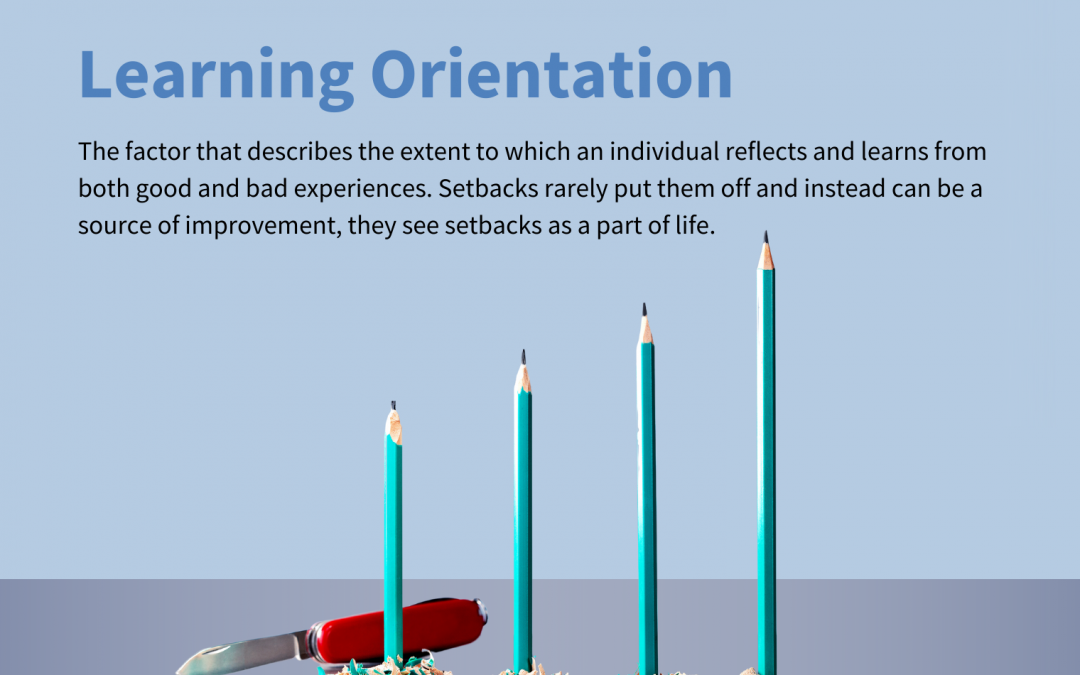The sixth in a series of posts about the eight factors that form the mental toughness concept, this article addresses Learning Orientation.
Mental Toughness is a personality trait that describes our mental responses, how we think, to stressors, challenges and opportunities that make up our life and work experiences.
Fundamentally important, it is a major influence on our behaviour – how we act.
Learning Orientation is the second of two factors that contribute to our overall sense of Challenge. Challenge embraces how we see opportunity or threat in the world around us and how we face and take on new experiences. This factor describes whether we learn from those experiences in order to perform better and to enjoy better well-being.
Some do learn, but many do not.
In some ways, this can be described as the “beating heart” of the mental toughness concept. Like many aspects of our personality, we know that it is part genetic, and part learned. Our learning orientation is important for our development.
The more mentally tough in this regard tend to be reflective. When things happen to them or around them, especially failure and setbacks, they are inclined to examine what has happened to extract the learning from it. Their purpose is to avoid repeating mistakes and to improve what they and others do. They tend to be solution-focused.
The more mentally sensitive tend not to stop and think about what has happened and often prefer to forget about a negative event because it can be uncomfortable to dwell on it. They can find that they repeat mistakes. Growth and Development can be slow and frustrating.
As with all the factors, it is possible to find two people, similar in all respects, where, faced with identical situations, one will see an opportunity for learning and the other will try to ignore it. It reflects a difference in mindset – our mental response.
This factor has particular relevance in education and in “high-risk” occupations where rejection or failure is the norm.
It is possible to see these extremes as good or bad. In fact, people are simply different. The issue here, as with the other factors, is to understand that difference and what it means for that individual and for others.
This factor is a spectrum with mental sensitivity at one end and mental toughness at the other. It is not a black and white idea – there are many shades in between.
And, although each factor is independent of the other, the way they can interplay will create different outcomes. There are many possible combinations.
So, even two people, who are similar in terms of reasonable levels of Learning Orientation, might differ if one has a high level of, say, Interpersonal Confidence (and happily explores setbacks with others) and the other has a low level (is reluctant to engage with others).
This illustrates the complexity of personality, that it is nuanced and how the mental toughness concept (and the MTQPlus) measure can bring that nuance to the practitioner.
The image helps us to get an insight into this. Think about how different levels of Risk Orientation might result in different outcomes with varying levels of the other 7 factors.

There is another layer of complexity to consider. All things being equal, being more mentally tough will give an advantage to the individual. But not always. It is possible for the mentally tough to struggle and for the mentally sensitive to thrive. The issue is self-awareness.
If self-aware, one can either develop mental toughness or one can adopt practices that help to compensate for the level of sensitivity. This is the essence of coaching.
How can a mentally tough person struggle? They can be obsessed with learning for learning’s sake and fail to translate what they learn into practice; they can reflect on everything, turning every negative into a positive without recognising the negative; They can also be intolerant of those who do not reflect and be dismissive or arrogant towards them.
As with Achievement Orientation, it can be difficult to see how lower levels of Learning Orientation can be positive. One way is where the more mentally sensitive can usefully draw attention to the need not to dwell too much on a negative event.
Given this degree of nuance is true for all eight factors and that all interplay with one another, we now have a lens through which we can help people to look at themselves with all the complexity involved and understand exactly where their development needs might lie.
This illustrates that the mental toughness concept is generally about differences and not about “good or bad” or labelling people as types or colours.
This enables customisation of development activity, avoiding the “one size fits all “approach to development which often fails because it does not take the individual into account. *
Assessment can be a challenge. These factors are invisible and any one, or combination, can explain behaviour or wellbeing. The research behind the concept has produced a reliable and valid psychometric measure, MTQPlus, that assesses this and the other factors.
The mental toughness concept and the MTQPlus measure represent a real advance in our understanding of individuals (and organisations). For practitioners who are in engaged in developing people and organisations, understanding mental toughness goes beyond CPD. It should really be part of their armoury.
Doug Strycharczyk 2023
Like the image used in this post on Learning Orientation and others in our ‘Eight Factors’ series? A set of downloadable posters are available here.



